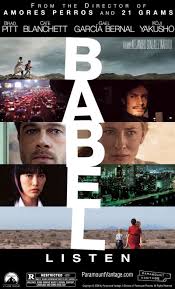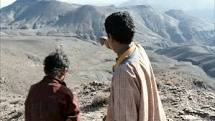Film: Babel
Director: Alejandro Gonzalez-Inarritu
Oscar nominations: 7 (Supporting Actress, Adriana Barraza; Supporting Actress, Rinko Kikuchi; Director, Alejandro Gonzalez-Inarritu; Editing; Original Score*; Picture; Original Screenplay, Guillermo Arriaga)
*denotes win

I've never really understood the people who believe that they don't need anybody. Granted, there's nothing wrong with a little alone time, when you can clear your thoughts and just enjoy the moment. But I believe that we all need other people in our lives, people we can talk to or be with that can make us laugh or provide support during a difficult time. In other words, I believe that communication is very important and an essential part of humanity. Babel has this same notion; it's a film that explores the various hindrances to communication in our daily lives, whether they be language barriers, deafness, or guilt.

The plot of Babel stretches across three continents with four interconnected stories. In Morocco, Richard and Susan Jones (Brad Pitt and Cate Blanchett, respectively) are on a vacation to try to fix their marital problems when Susan is hit by a bullet on a bus in the middle of nowhere. That bullet was fired by two boys, Yussef and Ahmed (Boubker Ait El Caid and Said Tarchani), who were given a rifle by their sheepherder father to shoot at jackals, but boys being boys, they play with it instead, aiming at passing cars and, unfortunately, buses. Meanwhile, the Jones' kids (Elle Fanning and Nathan Gamble) are under the care of their nanny, Amelia (Adriana Barraza), who takes them with her to her son's wedding in Mexico, along with her ne'er-do-well nephew Santiago (Gael Garcia Bernal). In Japan, Chieko (Rinko Kikuchi) is a deaf-mute girl lost in the world who's father (Koji Yakusho) may be involved in the shooting.
That's a lot of story, and the film weaves in and out of these narratives over it's almost two-and-a-half-hour running time. Luckily, the stories are coherent enough that keeping up is easy, and the payoff for each story individually and in the grand scheme of things is definitely satisfying. Writer Guillermo Arriaga's script is a probing glimpse at how we communicate with each other when language fails, but its Alejandro Gonzalez-Inarritu's terrific direction that holds it all together, juggling the stories with a deftness. He also pulls out some terrific performances from his ensemble. Pitt brings an intensity to his role, and Bernal is delightfully flinty. However, the two Oscar nominated performances rise above the rest: Barraza makes Amelia a well-meaning woman who gets in way over her head, and then desperately tries to rectify her mistakes. The true star in the making, though, is Kikuchi. By playing a deaf-mute, she perfectly illustrates the theme of communication by saying so much without saying anything at all; every stare, every frown, and every movement speaks volumes about her. Though she is physically nude for much of her arc, she's emotionally so the whole time, and when she reaches her emotional climax its nothing short of devastating. Its a phenomenal performance, and she deserves more great roles in the future.

There are some problems here, of course. The Moroccan stories sometimes lean too heavily on convention, and neither one packs as much of an emotional wallop as they should, especially Richard and Susan's. If the film had spent a little more time building the trouble in their marriage, it would have improved significantly. However, these problems are spare.
I know there are plenty of detractors for this film, but its one of my personal favorites from 2006. It works as a terrific ensemble drama as well as a reminder that we all need to communicate somehow, even if no one will listen.
Director: Alejandro Gonzalez-Inarritu
Oscar nominations: 7 (Supporting Actress, Adriana Barraza; Supporting Actress, Rinko Kikuchi; Director, Alejandro Gonzalez-Inarritu; Editing; Original Score*; Picture; Original Screenplay, Guillermo Arriaga)
*denotes win
I've never really understood the people who believe that they don't need anybody. Granted, there's nothing wrong with a little alone time, when you can clear your thoughts and just enjoy the moment. But I believe that we all need other people in our lives, people we can talk to or be with that can make us laugh or provide support during a difficult time. In other words, I believe that communication is very important and an essential part of humanity. Babel has this same notion; it's a film that explores the various hindrances to communication in our daily lives, whether they be language barriers, deafness, or guilt.
The plot of Babel stretches across three continents with four interconnected stories. In Morocco, Richard and Susan Jones (Brad Pitt and Cate Blanchett, respectively) are on a vacation to try to fix their marital problems when Susan is hit by a bullet on a bus in the middle of nowhere. That bullet was fired by two boys, Yussef and Ahmed (Boubker Ait El Caid and Said Tarchani), who were given a rifle by their sheepherder father to shoot at jackals, but boys being boys, they play with it instead, aiming at passing cars and, unfortunately, buses. Meanwhile, the Jones' kids (Elle Fanning and Nathan Gamble) are under the care of their nanny, Amelia (Adriana Barraza), who takes them with her to her son's wedding in Mexico, along with her ne'er-do-well nephew Santiago (Gael Garcia Bernal). In Japan, Chieko (Rinko Kikuchi) is a deaf-mute girl lost in the world who's father (Koji Yakusho) may be involved in the shooting.
That's a lot of story, and the film weaves in and out of these narratives over it's almost two-and-a-half-hour running time. Luckily, the stories are coherent enough that keeping up is easy, and the payoff for each story individually and in the grand scheme of things is definitely satisfying. Writer Guillermo Arriaga's script is a probing glimpse at how we communicate with each other when language fails, but its Alejandro Gonzalez-Inarritu's terrific direction that holds it all together, juggling the stories with a deftness. He also pulls out some terrific performances from his ensemble. Pitt brings an intensity to his role, and Bernal is delightfully flinty. However, the two Oscar nominated performances rise above the rest: Barraza makes Amelia a well-meaning woman who gets in way over her head, and then desperately tries to rectify her mistakes. The true star in the making, though, is Kikuchi. By playing a deaf-mute, she perfectly illustrates the theme of communication by saying so much without saying anything at all; every stare, every frown, and every movement speaks volumes about her. Though she is physically nude for much of her arc, she's emotionally so the whole time, and when she reaches her emotional climax its nothing short of devastating. Its a phenomenal performance, and she deserves more great roles in the future.
Comments